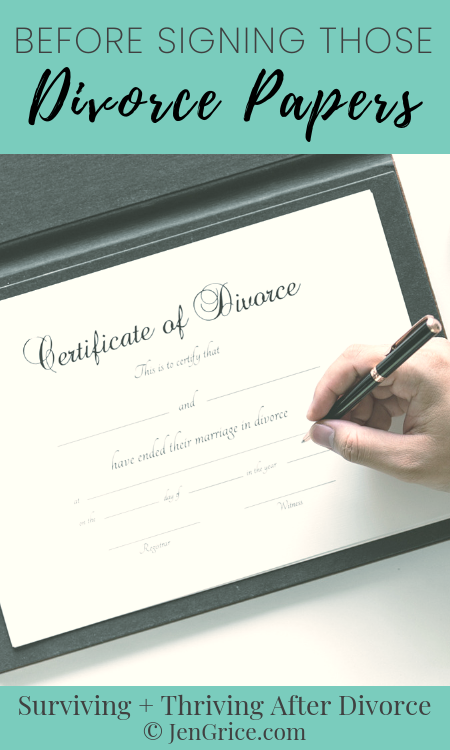I remember getting the first draft of the final judgment and divorce decree (the final papers that are signed by a judge declaring the marriage null and void and how the parties should act after the divorce). This was after a mediation meeting that I felt pushed to sign, by my own lawyer, when I didn’t fully agree to the terms of the agreement.
During the mediation, my Lupus was in full flare and I was taking prescription steroids just to get out of bed (thankfully I’m much better now). I wasn’t of sound mind to be in the meeting and my lawyer wasn’t looking out for my best interest or the future. She had fallen for the “prince charming” act that was being presented by the opposing parties.

I about fell over reading my final divorce papers. I cried and wailed at what I had agreed to, knowing it wasn’t right or fair. There were a lot of things in there I was never expecting to see and what was promised was conveniently left out.
I wasn’t prepared to sign.
Before you sign…
Make sure everything is spelled out in writing.
Anything that is verbally agreed upon cannot be enforced by any court or public officer. Anything open to interpretation can be argued or not taken seriously after. This includes anything having to do with money, child custody, and personal property. Don’t expect the other party to remember or do what they said they’ll do. Get it in writing and be specific so there is no room for arguing later.
Towards the end of my divorce process, the best advice I heard from a male lawyer was that I needed to quit thinking of the papers as the tearing apart of a family unit but for the dissolution of a “business organization.” I had to see the other party as an ex-business associate instead of someone who vowed to love me until death – and this was not death! (Even if it feels like it is.)
This allowed me to dry up my tears, separating my feelings from the paperwork, and start to fight for what I deserved… and get that in writing.
Do you fully agree with everything you’re signing?
The final divorce settlement agreement is a binding contract between you and your ex-husband that can very rarely be changed after. You’ll have to do or not do whatever this court order says to do for the amount of time it says to do this, as stated in the agreement. If you can’t agree to it, don’t sign it until you do.
The other parties in my case tried to add a gag order to the final divorce judgment. We had never even discussed that addition and everyone knew I was already a writer and blogger. (Coincidence? I doubt it!) I refused to sign anything like that… or I would not be writing this blog today.
Important note: Either party could be forced to sign, held in contempt of court (which could equal jail time), and/or the judge could sign on your behalf if you refuse to sign. Be very careful before refusing to sign legal documents. Know your rights (ask your lawyer) but also know the possible consequences for standing up for yourself.
Make sure you’ve done your research or asked enough questions (especially tax questions about settlements and alimony) so that you’re fully prepared to sign and understand what you’re signing and agreeing to. Make sure you’re stating what you will and will not agree to long before you get to the final signing.
Create a list early on in the divorce process that has what is most important to you written down – refer back to it often throughout the process. I include a printable sheet for this very thing in my (digital) Divorce Survival Tool Kit.
Will you keep your married name or change it?
Your final divorce decree needs to include your plans to change your name after the divorce. This is a personal preference and sometimes a hard decision to make. But make sure you’re doing it for the right reasons or don’t do it at all.
I often get the question, “Should I keep my married name or not after divorce?“
And the reasons vary from, I don’t want “his name”, he doesn’t want me to have his name, I’d like to keep the same name as my kids, or I’ve had this name for so long that I don’t want to change it now.
Those were some of the same thoughts I had as well. And I’m very happy with my final decision, even if it didn’t make others happy or I decide to remarry someday. My life, boundaries, and choices after divorce are about me and my child still living at home and no one else.
Yours should be as well!
We also recently tackled this subject in my Facebook divorce survival support group (now closed). Each lady had her own reasoning for keeping or changing her name. But each one thought through each aspect while weighed her pros and cons.
Things to consider when making “your name” change decision.
- Do you want to go through the process to change your name on every important document, at your bank, with the credit card companies, on Facebook, and so on?
- What do your children want? How will they feel about your name, either way, after divorce? Some kids don’t care and some do. Ask them to find out.
- What name do you feel most comfortable calling yourself? What about your signature?
- How important is your name, or a change of your name, to your profession? If you’re already known by a certain name (name tag or nameplate), keeping it the same might be the best choice for you.
- What is the main reason for your decision? Do not want to change your name to make someone else happy or out of spite? Because you may just be sorry for that down the road if that is the reason.
Most importantly, do what you think is best for you and your future. Ultimately, you’re the only one who has to live with your name (and what you’ve signed in the papers) for the rest of your life (unless you decide to pay to change your name later).
[socialrocket-tweet quote=”Be confident when signing your divorce papers that everything is in writing & you agree to it.” tweet=”Be confident when signing your divorce papers that everything is in writing & you agree to it.”]

What other important things need to be considered before signing those final divorce papers?
God bless your healing journey,



Leave a Reply